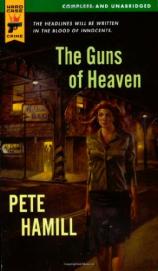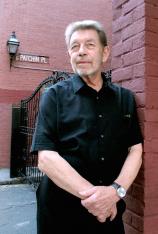The Guns of Heaven
Review
The Guns of Heaven
Just to clear up any confusion: THE GUNS OF HEAVEN is not a new CD by Van der Graaf Generator. A gentleman by the name of Peter Hammill is a member of that band, and he is in no way to be confused with Pete Hamill, the journalist and author of a number of revered works of nonfiction and fiction. Few people are neutral on Pete Hamill's work, but what cannot be easily denied is that THE GUNS OF HEAVEN is an underappreciated classic of thriller noir, a work of understated brilliance that dazzles from its opening sentences.
It was first published almost 23 years ago, but its newly released Hard Case Crime edition reads like a historical novel written last week, thanks to Hamill's timeless prose. The tale begins in Belfast, Northern Ireland, where newspaper reporter Sam Briscoe agrees to what appears to be a harmless favor but turns out to be a fool's errand. The task is simple enough: deliver an envelope from an IRA leader to his supporters in New York. Current readers benefiting from hindsight will be yelling "No! Don't!" almost from the beginning of the book. Nevertheless, they will be reading, not only to see how badly things will go for Briscoe but also to feast upon Hamill's descriptions of Belfast and his beloved New York, which shimmers like a phantom image over the present.
The plot, however, is the only excuse one needs to spend an afternoon or evening with this marvelous work, as Briscoe, by completing his mission, unintentionally brings the streets of New York into play as a potential new front in what is referred to in Northern Ireland as "the troubles." The fact that Briscoe's young daughter becomes a pawn makes matters much, much worse. Even as Briscoe is sorting out who is responsible for what, the countdown toward a tragedy with worldwide implications is taking place, with only Briscoe standing in the way of almost certain disaster.
Hamill's characters --- of which Belfast and New York are two --- are fine, drawn-out notes of a concerto played on a narrative Stradivarius. Even one who does not share Hamill's worldview will find much to appreciate here, not the least being Hamill's eye for detail and his ability to lead his reader through a complex, almost labyrinthine plot with nary a misstep. THE GUNS OF HEAVEN is an example of a master craftsman at the height of a storied career.
--- Reviewed by Joe Hartlaub
Review II
Great literature has always had the ability to echo the times in which it is created. But really great writers do not just reflect their times but also have the ability to foreshadow events to come in their work. Think of George Orwell's 1984.
Pete Hamill did that in a thriller he wrote in 1983 titled THE GUNS OF HEAVEN. Hard Case Crime has just reprinted this little gem of a book, which is, sadly, almost more relevant today than it was when it was first published 23 years ago. Hard Case Crime has done a great job with both their original works and reprints of long out-of-print books. This book might be their most important reprint yet.
Hamill is a bestselling author of fiction and nonfiction books, as well as one of America's most renowned journalists. In 2002, he wrote a novel called Forever, which was one of the first works of fiction to deal with 9/11.
What is amazing about THE GUNS OF HEAVEN is that its story dealt with the plotting of a terrorist attack in New York City a full decade before the first attack on the World Trade Center in 1993. The target in Hamill's book may be different and the perpetrators are not from the Middle East, but the root causes that drive people to commit acts of terror are fully exposed here.
Hamill's protagonist says, "That was the way it always seemed to go; you believed first in normal abstractions, in God, or country, or Karl Marx. And then you believed in guns. The guns of liberation. The guns of the dialectic. THE GUNS OF HEAVEN."
Sam Briscoe is a reporter for a New York newspaper who goes to Belfast, Northern Ireland to do a St. Patrick's Day article about the "Troubles" that up to that point had claimed 2,000 lives. Briscoe is met at the airport by his uncle, Frank, an old retired soldier of the original Irish Republican Army from the 1920s.
Briscoe interviews a man named Steel, the mysterious and charismatic leader of the new IRA who is waging a fierce guerrilla war against British occupation. Steel is kind of like an Irish Che Guevara both admired and feared.
Hamill uses the descriptive eye of a journalist to describe a city at war. "Those streets had filled later with Saracen tanks and British troops with thick polished boots, and some of the mill girls had learned to assemble Armalite machine guns in thirty-six seconds while the boys began again to sing ballads about dying for Ireland."
Hamill has always been able to craft lean tough sentences, mixing the skills of the reporter with the heart of a poet.
His character, Briscoe, has seen death close up and covered wars all over the world. Although Irish Catholic, he is anti-war. He gives us a lesson in the entire tortured history of Ireland where religion has been used by an Empire to divide poor people with much in common economically and rule over them.
"In this country," Briscoe says, "history was a curse, and so was religion, and I had come to stand with E.M. Foster: I did not believe in belief. Other human beings could believe that God was a tree, or the sun, or Mao Tse-tung, or a 1946 Servel refrigerator; I didn't care. But when their belief grew rancid with murder, I longed for a cold cleansing wind, a wind that here in Ireland would destroy all the churches and the collective Irish memory, a wind that would leave all of them, Catholics and Protestants, back in some innocent state, afraid in the night of storms and earthquakes and behemoths, but not each other."
But then Protestant extremists kill Briscoe's uncle and he gets drawn into the conflict. He agrees to deliver a letter from Steel to an address in Woodside, Queens in New York City.
When he gets home, Briscoe finds himself in the middle of a complex plot involving arms sales to the IRA, right wing Irish Protestant extremists and an American fundamentalist church. At the heart of the plot is a planned terrorist bombing of a major New York landmark that Briscoe has to stop. Each side believes it is working in the name of God or The Just Cause. They are all filled with murderous certainty.
"The shadow of the gunman was upon the land," Hamill wrote, describing his fictional New York.
It still is. Thankfully, the war between Irish Catholics and Irish Protestants has not been waged with bombs and bullets since the Easter Accord of 1998 brought a ceasefire, if not the final resolution of the conflict.
But the gunman still prowls the streets of war torn cities like Beirut and Baghdad and Kabul. The Shi'a and Sunni in Iraq butcher each other daily while waging war on "infidels" in the name of religion. We are so used to it by now that it hardly merits more than a quick sentence on the evening news. And Empires are still coming up with plans to divide people and "remake" the world to their benefit.
Hamill wrote this book in the last quarter of a century that had seen, estimates tell us, between 389 million and 640 million people killed in wars and violence. Much of that murder was done in the name of abstractions like God and Country and Political Ideologies, such as Fascism or Communist or Freedom.
While reading this book, I was reminded of the final paragraph of the column Hamill wrote for The Daily News on 9/11/01. He wrote, "Religious war, filled with the melodrama of martyrdom, had come to New York. Almost certainly, it was welded to visions of paradise. And in some ways, on the day of the worse single disaster in New York history, there was a feeling that the dying had only begun."
It still feels that way five years later. THE GUNS OF HEAVEN still shows us how the ancient grievances of the not dead past are never dead. How an obscure battle from 1689 can still make people bleed today. And, unfortunately, this 1983 book gave us a glimpse into our future. One can only hope that E.M. Forster's position might carry the day before it is too late.
In THE GUNS OF HEAVEN, Hamill wrote an excellent thriller that lived up to the standards of the genre and then transcended that genre to tell us something important about our world. The book contains some of Hamill's most passionate and powerful writing. It is a joy to read.
Great writers provide that transcendence. Pete Hamill proves again here why he is one of our greatest writers. Read this book.
--- Reviewed by Tom Callahan
Reviewed by Joe Hartlaub and Tom Callahan on August 29, 2006




